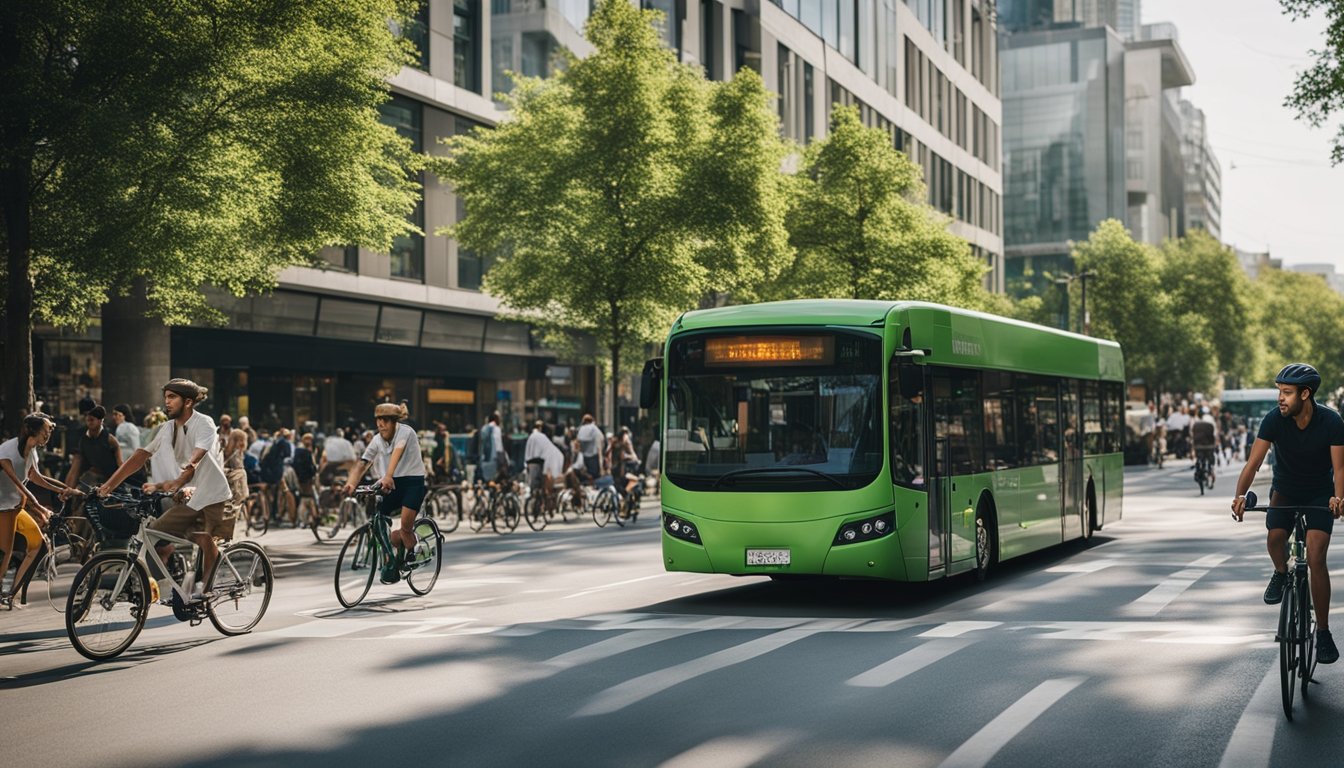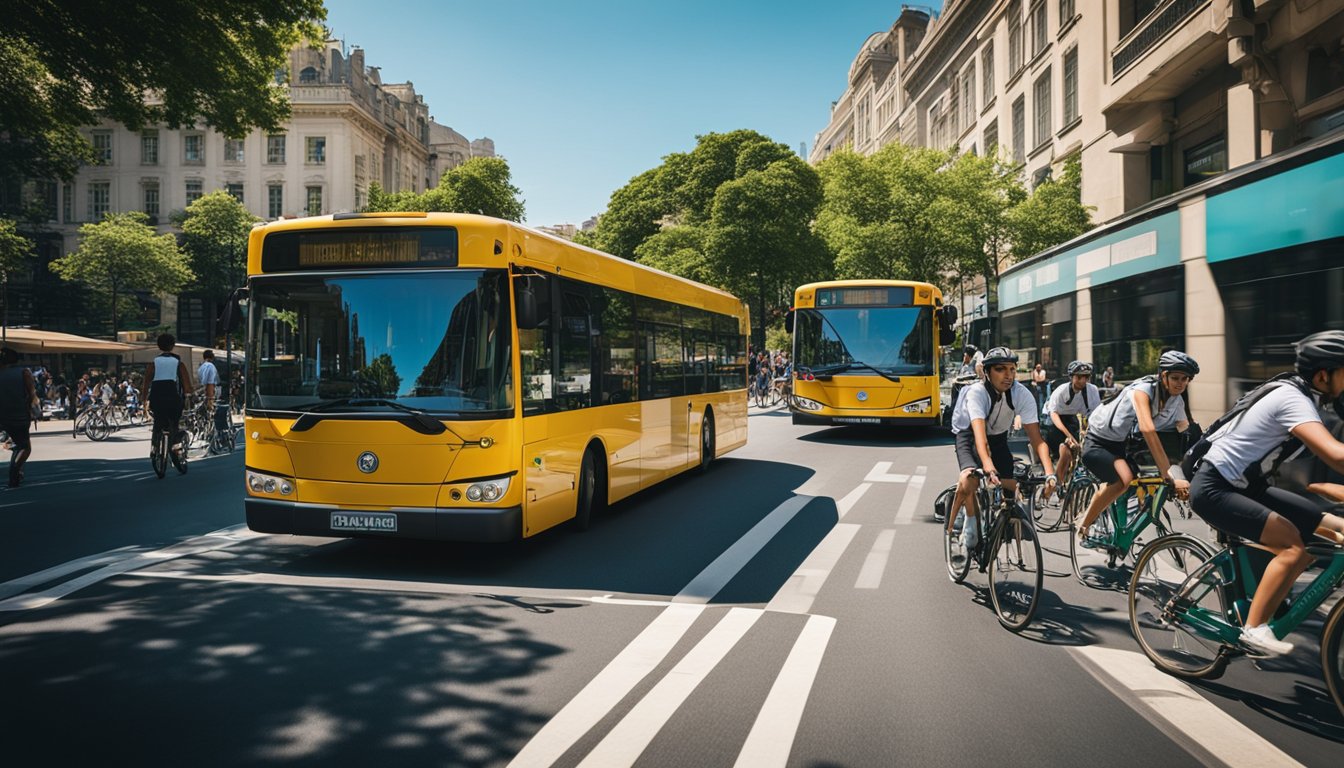Late updated: 12 Dec 2024 10:12
Written by: Amber Collins
Sustainable Commute Options For UK Employees: Embracing Eco-Friendly Travel
In today's climate-conscious world, we must carefully consider how our daily travels impact the environment. As UK employees navigate their way to work, sustainable commuting options are becoming increasingly imperative. Cycling, walking, and using electric vehicles are some of the greenest ways to commute. These modes not only reduce carbon emissions but also improve physical health and offer cost savings in the long run.

Many organisations are already contributing to this shift by promoting eco-friendly commuting choices. Employers are recognising the benefits of providing incentives for sustainable transport and flexible working conditions. Such measures support employee well-being and reflect a commitment to responsibility and sustainability, which ultimately can enhance a company's public image.
Let us explore the best strategies for implementing sustainable commuting practices. How can employees make greener choices, and what role do employers play in supporting this transition? Together, we can find feasible ways to prioritise both environmental responsibility and the daily journey to work.
Key Takeaways
- Green commuting options include walking, cycling, and electric vehicles.
- Employers can support sustainable commutes through incentives and flexible working.
- Sustainable commuting enhances both employee well-being and corporate responsibility.
Understanding Sustainable Commute Options

As we explore sustainable commute options, it’s essential to understand their impact on both the environment and our well-being. This piece highlights the environmental effect of traditional commuting methods and underscores the advantages of adopting sustainable alternatives.
The Impact of Commuting on the Environment
Commuting significantly contributes to increasing greenhouse gas emissions, primarily CO2 emissions. Cars are one of the leading sources of carbon emissions, which contribute massively to climate change and urban air pollution.
Employee commuting often falls under Scope 3 emissions, as per the GHG Protocol, and constitutes a substantial part of a company's carbon footprint. Reducing commuting emissions supports broader environmental responsibility and aligns with decarbonisation plans. Implementing sustainable measures can be a step towards achieving net zero goals.
Benefits of Sustainable Commuting Methods
Choosing sustainable commuting methods offers several benefits both environmentally and personally. Options such as cycling, walking, and using public transport reduce individual carbon footprints significantly. They also promote healthier lifestyles by increasing physical activity.
Organisations can enhance employee engagement by encouraging these methods, offering incentives, or supporting flexible work arrangements. Using electric vehicles can also be a viable alternative, lowering average commuter emissions levels. By fostering a culture of sustainability, we contribute to a cleaner environment and help move towards a more responsible future.
Implementing Sustainable Commute Practices for UK Employees
Our focus on sustainable commute practices creates opportunities for UK employees to engage in environmentally friendly travel habits. By promoting active travel and integrating flexible work options with workplace mobility programmes, we aim to improve both employee well-being and productivity while minimizing commuting emissions.
Promoting Active Travel and Flexible Working Options
Encouraging walking and cycling offers significant benefits. Programmes like the Cycle to Work scheme provide financial support for employees to purchase bicycles. By facilitating access to resources such as safe cycling paths and secure bike storage, we increase participation in active travel.
Flexible working arrangements, including remote work and adaptable hours, reduce commuting needs. This alleviates traffic congestion and cuts down carbon emissions significantly, making substantial contributions to sustainability goals. Scoping smart mobility solutions and considering employee postcodes can enhance our strategies.
Transport and Mobility Programmes in the Workplace
Instituting workplace transport programmes involves car-sharing and public transport incentives. Mobilityways platforms help organisations optimise commuting routes and car-sharing opportunities, fostering a culture of sustainability.
Carpooling initiatives and electric vehicle incentives, such as EV salary sacrifice schemes, support green commuting. Encouraging use of public transport with subsidies or discounts enhances accessibility to sustainable travel. Policies encouraging these practices may be integrated within our travel policy framework, which we can tailor to regional needs, such as those identified in places like Cheshire Constabulary.
This strategic approach not only supports environmental objectives but also increases employee engagement by demonstrating a commitment to responsible corporate practices.
Frequently Asked Questions

In this section, we address common queries about sustainable commute options available to employees in the UK. These answers aim to provide clarity on eco-friendly alternatives, specific schemes for NHS staff, and facilities that support green commuting methods.
What are the eco-friendly alternatives for travelling to work for UK employees?
UK employees have several eco-friendly options, including walking, cycling, using public transport, and car-sharing. Each mode reduces the impact on the environment by lowering greenhouse gas emissions compared to solo driving.
How can NHS staff in the UK travel to work in a sustainable manner?
NHS staff can use subsidised public transport, dedicated cycling routes, and car-sharing schemes. Many NHS facilities offer secure bike parking and showers to support cycling.
What facilities are available for bicycle commuting for employees in the UK?
Employers often provide bike racks, lockers, and showers for cyclists. Some organisations participate in cycle-to-work schemes, offering tax benefits to those purchasing bicycles for commuting.
What are the operating hours for public buses utilised by UK workers?
Public buses in the UK generally operate from early morning to late evening, offering services that align with typical working hours. Timetables vary by region, so checking local schedules is recommended.
Can UK employees access any incentive schemes to promote green commuting methods?
Yes, schemes such as the cycle-to-work programme and public transport subsidies help employees reduce costs and support sustainable choices. These incentives make green commuting more attractive and accessible.
What initiatives form the backbone of the UK's sustainable transport strategy?
The UK's strategy includes investing in public transport infrastructure, expanding cycle lanes, and promoting electric vehicle use. These efforts aim to create a comprehensive system that supports sustainable commuting practices.
